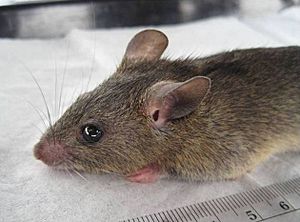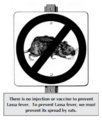Lassa fever facts for kids
Lassa fever is a serious illness caused by the Lassa virus. It is mostly found in West Africa. About 1 out of 80 people who get Lassa fever might die. If someone gets very sick and needs to go to the hospital, the risk of death is higher, about 1 in 5. Doctors first learned about Lassa fever in 1969. It was named after a town in Nigeria where it was first found.
Contents
How Lassa Fever Spreads
Lassa fever usually spreads from rodents to humans. The main animal that carries the virus is a type of mouse called Mastomys natalensis. People can get the virus if they touch the droppings (poop) or urine of infected rodents.
The virus can also spread from person to person. This happens if someone touches the blood or body fluids of an infected person. It does not spread through the air, like a cold. It is not very easy for people to catch it from each other. However, it can spread more easily among very sick patients. Doctors and nurses need to be very careful when treating patients. They wear special gear to protect themselves from the virus.
Signs of Lassa Fever
Most people (about 80%) who get Lassa fever do not feel sick at all. They might not even know they have it. But in about 20% of cases, the disease becomes very serious. Around 5,000 people die from it each year.
If someone does get sick, symptoms usually appear 5 days to 3 weeks after they catch the virus. During this time, the virus is "sleeping" inside the body. After this, different symptoms can start to show up, such as:
- Throwing up (sometimes with blood)
- Diarrhea (sometimes with blood)
- Feeling sick to your stomach
- Stomach ache
- Trouble pooping
- Difficulty swallowing
- Coughing
- Seizures (fits)
Finding and Treating Lassa Fever
Doctors can test for Lassa fever in special labs. However, many places in West Africa do not have the right equipment for these tests. This means it can be hard to know for sure if someone has Lassa fever.
If a patient is found to have Lassa fever, they are kept away from other people. This helps stop the virus from spreading. If caught early, Lassa fever can be treated with a medicine called Ribavirin. This medicine is not very expensive. But for many people in affected areas, it can still be hard to afford. Patients might also need blood transfusions or extra fluids to help them get better.
Pregnant women who are very sick might need to have their baby early. This can help both the mother and the baby survive. Thanks to the use of Ribavirin, fewer people are dying from Lassa fever now.
Preventing Lassa Fever
It is hard to control all the rodents in areas where Lassa fever is common. So, the best way to prevent it is to keep rodents out of homes and public places. This stops people from touching infected droppings.
Sick patients should also be kept separate from others. This helps prevent the virus from spreading from person to person. In richer countries, health groups can easily watch for diseases like Lassa fever. This helps stop outbreaks. But poorer countries often do not have enough money for these services.
Scientists are also working on a vaccine for Lassa fever. A vaccine has shown good results in some animals. But it has not yet been proven to work in humans.
Images for kids
See also
 In Spanish: Fiebre de Lassa para niños
In Spanish: Fiebre de Lassa para niños
 | Tommie Smith |
 | Simone Manuel |
 | Shani Davis |
 | Simone Biles |
 | Alice Coachman |





